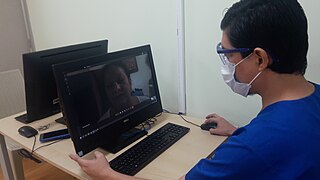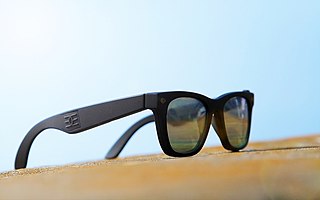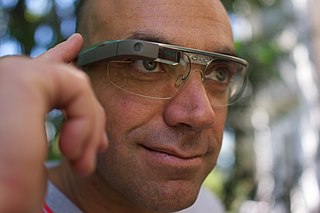University of Mississippi Medical Center (UMMC) is the health sciences campus of the University of Mississippi and is located in Jackson, Mississippi, United States. UMMC, also referred to as the Medical Center, is the state's only academic medical center.

Telehealth is the distribution of health-related services and information via electronic information and telecommunication technologies. It allows long-distance patient and clinician contact, care, advice, reminders, education, intervention, monitoring, and remote admissions. Telemedicine is sometimes used as a synonym, or is used in a more limited sense to describe remote clinical services, such as diagnosis and monitoring. When rural settings, lack of transport, a lack of mobility, conditions due to outbreaks, epidemics or pandemics, decreased funding, or a lack of staff restrict access to care, telehealth may bridge the gap as well as provide distance-learning; meetings, supervision, and presentations between practitioners; online information and health data management and healthcare system integration. Telehealth could include two clinicians discussing a case over video conference; a robotic surgery occurring through remote access; physical therapy done via digital monitoring instruments, live feed and application combinations; tests being forwarded between facilities for interpretation by a higher specialist; home monitoring through continuous sending of patient health data; client to practitioner online conference; or even videophone interpretation during a consult.

UC Davis Medical Center (UCDMC) is part of UC Davis Health and a major academic health center located in Sacramento, California. It is owned and operated by the University of California as part of its University of California, Davis campus. The medical center sits on a 142-acre (57 ha) campus (often referred to as the Sacramento Campus to distinguish it from the main campus in nearby Davis) located between the Elmhurst, Tahoe Park, and Oak Park residential neighborhoods. The site incorporates the land and some of the buildings of the former Sacramento Medical Center (which was acquired from the County of Sacramento in 1973) as well as much of the land (and two buildings) previously occupied by the California State Fair until its 1967 move to a new location.

Apollo Hospitals Enterprise Limited is an Indian for-profit private hospital network headquartered in Chennai. It is the largest hospital chain in India, with a network of 71 owned and managed hospitals. Along with the eponymous hospital chain, the company also operates pharmacies, primary care and diagnostic centres, telehealth clinics, and digital healthcare services among others through its subsidiaries.

Blue Cross Blue Shield Association is a federation, or supraorganization, of, in 2022, 34 independent and locally operated BCBSA companies that provide health insurance in the United States to more than 115 million people. It was formed in 1982 from the merger of its two namesake organizations: Blue Cross was founded in 1929 and became the Blue Cross Association in 1960, while Blue Shield emerged in 1939 and the Blue Shield Association was created in 1948.

Microsoft Amalga Unified Intelligence System was a unified health enterprise platform designed to retrieve and display patient information from many sources, including scanned documents, electrocardiograms, X-rays, MRI scans and other medical imaging procedures, lab results, dictated reports of surgery, as well as patient demographics and contact information.

38 Studios, LLC was an American entertainment and video game development company founded in 2006 by Major League Baseball player Curt Schilling and named for his jersey number. Originally based in Massachusetts, the company moved to Rhode Island as part of securing a $75 million loan guarantee from that state's quasi-public Economic Development Corporation (EDC). In February 2012, the company released its only title, Kingdoms of Amalur: Reckoning, a single-player action role-playing video game for several platforms. The game received positive reviews and sold an estimated 330,000 copies in its first month, rising to 1.2m copies in the first 90 days. 38 Studios shut down a few months later. The failure of the controversial Rhode Island loan spurred investigations by the news media and the government.

The University of New Mexico Hospital is a public teaching hospital located in Albuquerque, New Mexico, immediately north of the main campus of the University of New Mexico. The hospital is the only Level I trauma center in the state of New Mexico, and also houses the only certified burn unit and designated stroke center in the state. In addition, UNMH also contains the only children's hospital in New Mexico, and is the state's sole source of 13 pediatric sub-specialties. As a safety net hospital, UNMH serves a large percentage of the uninsured and under-insured population of the state. The hospital is the main teaching facility for the University of New Mexico School of Medicine.
Abdali Hospital is a multi-specialty hospital located in the modern development of Al-Abdali, Amman, Jordan. The hospital was founded by the investment group behind the Clemenceau Medical Center in Beirut, which is affiliated with Johns Hopkins Medical Center in Baltimore, Maryland. The hospital treats numerous health conditions and receives grants for medical laboratory services. Abdali Hospital opened on 1 July 2019 and began receiving patients in early September 2019.
Doximity is an online networking service for medical professionals. Launched in 2010, the platform offers its members curated medical news, telehealth tools, and case collaboration.

Epiphany Eyewear are smartglasses developed by Vergence Labs. The glasses record video stored within the glasses' hardware for live-stream upload to a computer or social media. The glasses use smartphone technology. The head mounted display is a mobile computer and a high-definition camera. The glasses take photographic images, record or stream video to a smartphone or computer tablet.
CrowdOptic, Inc. is a privately held San Francisco-based medical technology company founded in 2011. CrowdOptic, led by CEO Jon Fisher, is best known for its augmented reality technology and triangulation algorithms used in medicine, sports, and government that gathers and analyzes data from smart devices based on where they are pointed to identify areas of interest. As of 2016, CrowdOptic remains the only patented solution for wearables like Google Glass and Sony SmartEyeGlass.

Smartglasses or smart glasses are eye or head-worn wearable computers that offer useful capabilities to the user. Many smartglasses include displays that add information alongside or to what the wearer sees. Alternatively, smartglasses are sometimes defined as glasses that are able to change their optical properties, such as smart sunglasses that are programmed to change tint by electronic means. Alternatively, smartglasses are sometimes defined as glasses that include headphone functionality.
American Well Corporation, doing business as Amwell, is a telemedicine company based in Boston, Massachusetts, that connects patients with doctors over secure video. Amwell sells its platform as a subscription service to healthcare providers to put their medical professionals online and its proprietary software development kits, APIs, and system integrations enable clients to embed telehealth into existing workflows utilized by providers and patients.
Talkspace is an online and mobile therapy company based in New York City. It was founded by Oren and Roni Frank in 2012. Talkspace users have access to licensed therapists through the website or mobile app on iOS and Android. Talkspace has made questionable claims about its effectiveness, compromised user privacy, posted fake reviews to improve its rating in an app store, and uses freelance therapists of uncertain qualifications.
Teladoc Health, Inc. is a multinational telemedicine and virtual healthcare company headquartered in the United States. Primary services include telehealth, medical opinions, AI and analytics, telehealth devices and licensable platform services. In particular, Teladoc Health uses telephone and videoconferencing software as well as mobile apps to provide on-demand remote medical care.

Nomad Health is an online marketplace that directly connects physicians, nurses, and medical facilities for healthcare jobs, without the involvement of third party employment agencies. Nomad Health is based in New York City.
American Addiction Centers is a Brentwood, Tennessee-based healthcare facilities and services company providing treatment for substance use disorders and mental health disorders.
Ray-Ban Stories are smartglasses created as a collaboration between Meta Platforms and EssilorLuxottica. The product includes two cameras, open-ear speakers, a microphone, and touchpad, all built into the frame. The glasses, announced in August 2020 and released on September 9, 2021, had a controversial reception stemming from mistrust over Facebook’s privacy scandals. The small size of the recording indicator light has also led to controversy post-release. Ray-Ban Stories are the latest in a line of smartglasses released by major companies including Snap Inc and Google and are designed as one component of Facebook’s plans for a metaverse. Unlike smart glasses previously created by other companies, the Ray-Ban Stories do not include any HUD or AR head-mounted display.

Telehealth is the practice of providing healthcare via communication between the healthcare practitioner and the patient through electronic (virtual) methods such as telephones, smartphones, tablets, and computers. Telehealth permits patients to communicate with professionals via telephone, secure email, video chat, and in some instances secure messaging. Physicians may also utilize the telehealth systems for remote monitoring of patients at home. When the telehealth industry was founded, it was primarily used to provide services to underserved and rural area patients, enabled people to connect to specialists not located nearby. Telehealth was initially used predominantly for specialties such as cardiology, neurology, mental health, and dermatology. Telehealth has expanded to include many new applications such as physical therapy through digital monitoring tools and surgery done remotely using robots. The first major telehealth company, Teladoc, was founded in 2002 and since then the industry has grown to include companies such as Amwell, MeMD, and iCliniq.










